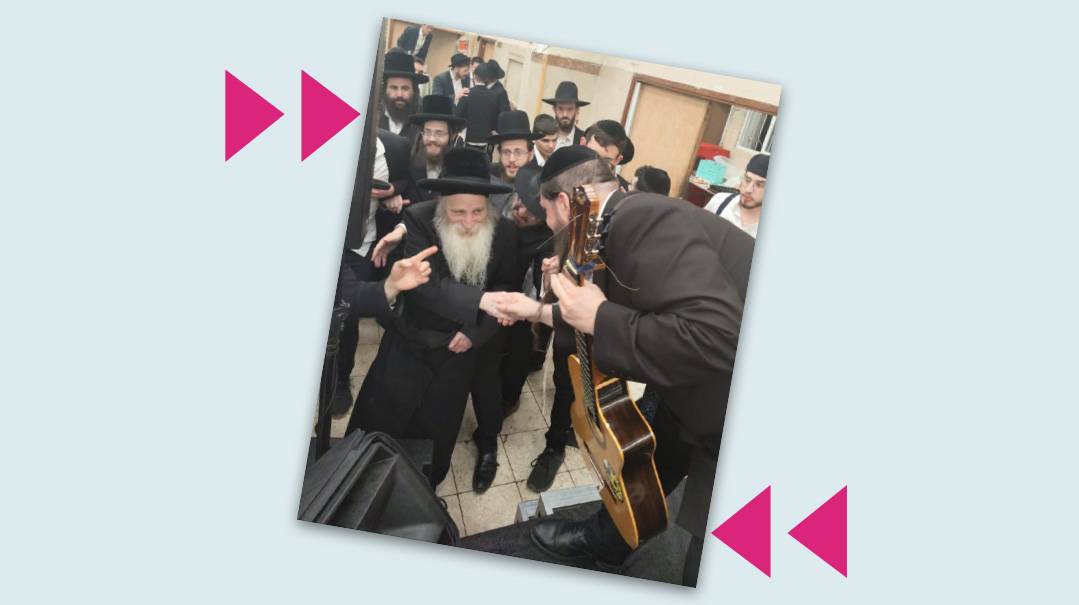Mood Mix with Ari Zoldan
| June 6, 2023As a professional voice coach, Ari Zoldan uses his expertise and experience to train others’ voices so they can shine in song, too

By night, you can find popular vocalist ARI ZOLDAN on stage at weddings and events. By day, when he’s not volunteering his time to bring a bit of joy to hospital patients, he's at work as a voice coach in Lakewood, using his expertise and experience to train others’ voices so they can shine in song, too.
A WEDDING I’LL NEVER FORGET
There was one wedding in Lakewood where the kallah’s father was very ill with cancer. The mother came over and said to me, “It seems like it will be our last simchah together. Please, sing for as long as you can. Just go on and on and on.” Emotionally charged, I gave it my all, singing and singing to extend the night that they wished could go on forever.
THE MOST COMMON CHUPPAH PICKS
Moshe Tischler’s “Tefillas Haneiros” is probably the most common request at the moment, although the more conservative types still expect to hear “Pnei L’elbon” or “Maskil LeDovid.”
THE SEASON’S HOTTEST SECOND-DANCE SONG
Matt Dubb’s “L’chai Olamim” with Mordechai Shapiro and Benny Friedman. And his “Va’ani Evtach Bach,” with Beri Weber and Shmueli Ungar is a close second.
AN INSTRUMENT I WISH I PLAYED
I play piano, guitar, and drums. But I always thought it would be great to master violin.
A JEWISH MUSIC ARTIST I FEEL CONNECTED TO
Abie Rotenberg, and especially his Journeys material, with its deep messages. Abie’s no spring chicken, but he still feels the pulse of a new generation and has stayed totally relevant. An example is the song “Butterfly,” which he recently released for Ohr Naava in tribute to Rabbi Zecharia Wallerstein, with a message about every person’s special space in Hashem’s world.
SOME MEMORABLE CHUPPAH BLOOPERS
I was singing at a hall in Monsey, when the photographer plugged his lights into the same socket that the sound system was plugged into. The chassan was walking down, and just as I was reaching the high part of “Maskil LeDovid,” the socket blew and the music went dead. Everyone present turned around to the back, and even the chassan stopped still for a second, unsure of what to do next.
At another Monsey wedding in the dead of winter, they only told us when we arrived that they would be having an outdoor chuppah. It was raining and windy, and I was shivering through and through. The violinist even stopped playing in the middle — his fingers were numb and he couldn’t feel his strings. Baruch Hashem, we always managed to pull through in the end.
AN ALBUM I’D TAKE ALONG FOR A ROAD TRIP
Shwekey’s “Those Were the Days, Volume II.” So many incredible flavors in one album, with something in there for everyone.
THE BEST CONNECTORS FOR A GROUP
It’s the simple music that I find connects people, material like Carlebach’s “Shifchi Kamayim” and “Esa Einai.” We’re still singing Carlebach songs at kumzitzes today, and of course there is all the contemporary Carlebach-influenced music, like that of Eitan Katz, Naftali Kempeh, Yehuda Green, Zusha, and others. The simplicity and “straightness” mean that the songs are not intimidating and everyone can sing along. The complex songs may get requested at chuppahs, but how many people can feel at ease actually singing them?
A SONG THAT REMINDS ME OF MY GRANDPARENTS
“A Yiddishe Mamme.” I used to call and sing it to my grandmother every Friday. A Holocaust survivor born in the well-known Jewish community of Uhjel, my grandmother lived in Boro Park until her recent petirah. She played piano, and her own mother had been a violinist. She told me that she got through the war by singing to Hashem. I still use the keyboard she bought me, and she was the one who waited for me in the car when I went to try out my chassidish havarah for my first client. The other song she enjoyed hearing me sing was Baruch Levine’s “Ufaratzta,” and that featured on our Friday phone calls too.
MY DREAM DUET
It would be great to hit some high notes side by side with Zanvil Weinberger. As a professional voice coach, I’m a big fan of Zanvil, although we’ve never met. He has a range like no one else I know in the world of Jewish music, and his control and the way he switches between his head voice and his chest voice is incredible.
A SINGER’S MOST COMMON VOICE ISSUE
Instead of keeping the larynx, or voice box, relaxed and in its natural place, a lot of people make the mistake of pulling it up when they reach for the high notes. It then gets squeezed and imbalanced.
HOW I GOT INTO THE FIELD
One Shabbos around seven years ago, I was davening in shul, singing along to Kabbalas Shabbos, when a chassidish guy came over to me and said, “I want you to sing at my wedding.”
I had no plans to sing professionally at weddings, although I’d taken voice lessons for years, so I told him that I don’t sing and also that I’m not chassidish. But two weeks later I got a call: “Is this the singer, Zoldan? Remember I told you? I want you to sing at my wedding.” It was this guy, who’d tracked me down via my roommate in BMG. At that stage, he was so persistent that it seemed inevitable, but he had a proviso, too: The singing had to be in a chassidish havarah. That part wasn’t a problem for me, as I grew up in Boro Park and went to a chassidish yeshivah. The fellow arranged for his father to hear me sing so that he could confirm the havarah was “legit chassidish,” and I was hired. At the wedding, someone else came over and asked if I could sing at his simchah, too….
MY VOICE CLIENTS
They range in age from ten to 74, from baalei tefillah to professional singers, to people who just want to sing zemiros without embarrassment. I also do Zoom and have students across North America and even in Israel. What people generally don’t know is that even those who are tone-deaf can be coached using a method called “ear training,” which trains them to be able to sing on-key. I help them pick up basic skills and self-confidence.
One of my clients commutes daily from Lakewood to Brooklyn and likes to sing on the drive. He used to arrive at work every day with a hoarse voice, but I was able to teach him how to use his voice so that he could still enjoy singing while not harming his larynx.
(Originally featured in Mishpacha, Issue 964)
Oops! We could not locate your form.






